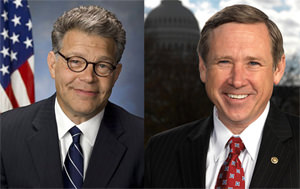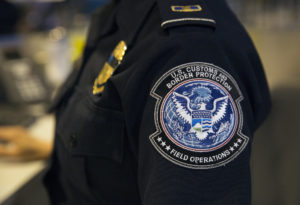Truthdiggers of the Week: NDAA Dissenters in Congress
Though they couldn't stop the freedom-crushing National Defense Authorization Act of 2012 from becoming law, Truthdig salutes the efforts of the members of the U.S. Congress who took a stand against the NDAA in the final round of voting this week.
Though they couldn’t stop the freedom-crushing National Defense Authorization Act of 2012 from becoming law, Truthdig salutes the efforts of the members of the U.S. Congress who took a stand against the NDAA in the final round of voting this week. There are too many of them to list by name here, but unfortunately, there weren’t enough of them to block the bill’s passage, which a flip-flopping President Obama was slated to sign Friday. Nonetheless, for doing their part to protect our civil liberties, even in the face of formidable political pressure, the 149 senators and representatives who said nay to the NDAA get our vote as our Truthdiggers of the Week.
First, a little background. We have been watching this process with growing incredulity and concern as the bill climbed higher on Congress’ priority list, and for a while it seemed that two troubling clauses in H.R. 1540 — specifically, Sections 1031 and 1032 — would make the NDAA veto bait for Obama if it actually made it to that point in the legislative process. But this appears to be one of those issues that escapes the kind of public attention (read: outrage) it deserves because of a dismaying lack of information and discussion in the mainstream media, as well as some spin on the part of supportive legislators and a sneaky timeline for the voting process: just in time for the holidays!
By the end of last month, though, the Senate had successfully ushered the measure through to the next stage of deliberations on Capitol Hill. This despite the president’s concerns, expressed as follows in a “Statement of Administration Policy” about the bill on Nov. 17: “The administration objects to and has serious legal and policy concerns about many of the detainee provisions in the bill.”
On that note, let’s take a closer look at the objectionable aspects of the 2012 NDAA. These “detainee provisions” to which Obama’s camp was referring enable the indefinite detention, without trial, of U.S. citizens suspected of terrorism (Section 1031), and Section 1032 stipulates that the U.S. military detain suspected noncitizens. The New York Times broke it down thusly after the Senate’s initial vote on Nov. 29:
The New York Times:
The most disputed provision would require the government to place into military custody any suspected member of Al Qaeda or one of its allies connected to a plot against the United States or its allies. The provision would exempt American citizens, but would otherwise extend to arrests on United States soil. The executive branch could issue a waiver and keep such a prisoner in the civilian system.
A related provision would create a federal statute saying the government has the legal authority to keep people suspected of terrorism in military custody, indefinitely and without trial. It contains no exception for American citizens. It is intended to bolster the authorization to use military force against the perpetrators of the terrorist attacks of Sept. 11, 2001, which lawmakers enacted a decade ago.
The next troubling moment in this scary saga happened Wednesday, when President Obama reneged on his veto threat and the bill sailed through the House with 65 percent of its members voting in favor of the NDAA with the detainee provisions intact. (Click here to see a series of handy pie charts documenting the bill’s progress.) Regardless of the efforts of organizations like the ACLU and the horror broadcast by “alternative” media outlets, many of them online, this story failed to have the impact it should have registered in the MSM and the public at large. Truthdig’s own Robert Scheer decried these developments in his column after Wednesday’s vote, interpreting the bill’s most objectionable portion and warning that it “assumes a permanent war against terrorism that extends the battlefield to our homeland.”
Even if President Obama couldn’t listen to the words of caution coming from the likes of Defense Secretary Leon Panetta and FBI chief Robert Mueller, 136 members of the House of Representatives registered their disapproval of the bill in its final go-round, and 13 senators joined them. Six Republican senators dissented, including Rand Paul and Jim DeMint, and an equal number of Democrats, including Al Franken and Dick Durbin, along with Independent Sen. Bernie Sanders. As for the House, the breakdown was 93 Democrats and 43 Republicans. Good to know they were pushing back against this alarming, and ultimately successful, assault on Americans’ most sacred rights, even when the president failed to do his part. –KA
Your support matters…Independent journalism is under threat and overshadowed by heavily funded mainstream media.
You can help level the playing field. Become a member.
Your tax-deductible contribution keeps us digging beneath the headlines to give you thought-provoking, investigative reporting and analysis that unearths what's really happening- without compromise.
Give today to support our courageous, independent journalists.






You need to be a supporter to comment.
There are currently no responses to this article.
Be the first to respond.